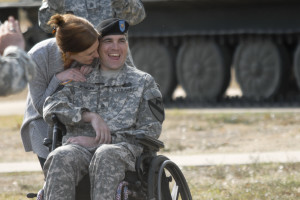How Does FMLA Differ for Family Members of Veterans?
 If you or someone you love is in the military, it is important to learn about how the rules of FMLA for military family members differ from the rules for civilians.
If you or someone you love is in the military, it is important to learn about how the rules of FMLA for military family members differ from the rules for civilians.
FMLA, which stands for Family and Medical Leave Act, is a federal law that is designed to protect employees from the threat of losing their job if they have satisfied the requirements and experience a situation where they qualify for up to 12 weeks of leave. While some of the most common reasons why eligible employees files for FMLA are for serious medical conditions or the birth of a child, there is a qualifying exigency clause that protects children, parents or spouses of active duty military personnel.
Read on and learn more about this qualifying event and how FMLA will apply to you.
Who is Eligible for Military Family Leave?
Military families experience unique situations when the service member is relocated or called for duty. Because deployments can last much longer than the standard 12 weeks, there are unique entitlements and rules for those who file Military Family Leave. In order to use FMLA, you must work for a covered employer who has more than 50 employees or for a public agency. You also must have worked for the employer for more than 12 months and worked at least 1250 hours during this 12 month period. If you meet these requirements and your spouse, child or parent is a service member, you are eligible for FMLA.
How Do the Leave Options Differ for Military Options
A civilian who is not part of a military family can file leave for medical illness, birth of a child, caring for a dependent, or adoption. When you are a military spouse, child or parent, you may be eligible to file one of two different types of leaves: Qualifying Exigency Leave or Military Caregiver Leave.
A Qualifying Exigency is designed to help families handle immediate issues when a family member is deployed internationally. You may need to handle daycare arrangements, deal with housing, or attend military ceremonies. This leave allows you to take up to 12 work weeks off without a threat of losing your job.
A Military Caregiver Leave is for scenarios where your family member becomes seriously ill, is diagnosed with a serious mental condition, or is injured while serving. When this happens, you are free to take up to 26 work weeks off so that you can care for your loved one and provide them with support during the difficult time. It may be possible to take a second 26 week period off to care for a different illness or injury subsequently when there are multiple diagnoses.
In addition to protecting your job, the act will protect your medical insurance if you have elected to carry it through work. Knowing how federal employment laws like FMLA apply to you as a military spouse, child or qualifying parent is crucial. When you need to exercise the laws, it can really give you peace of mind to know that you have the time to spend with your service member without having to worry about your source of income. FMLA for military family members may be unpaid, but the protection of the job can be invaluable when you are ready to return to work.
See also: What is the Genetic Information Nondiscrimination Act?